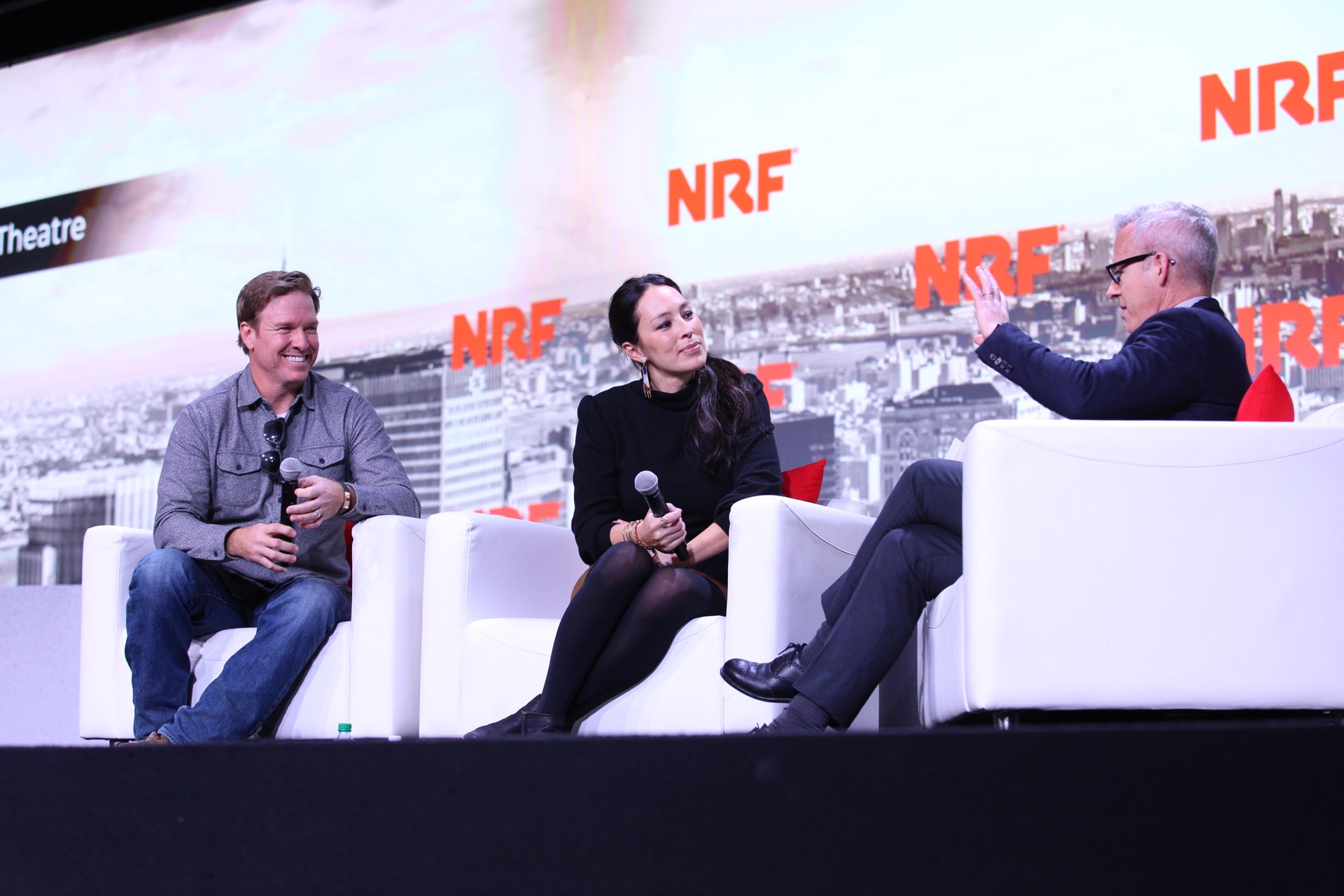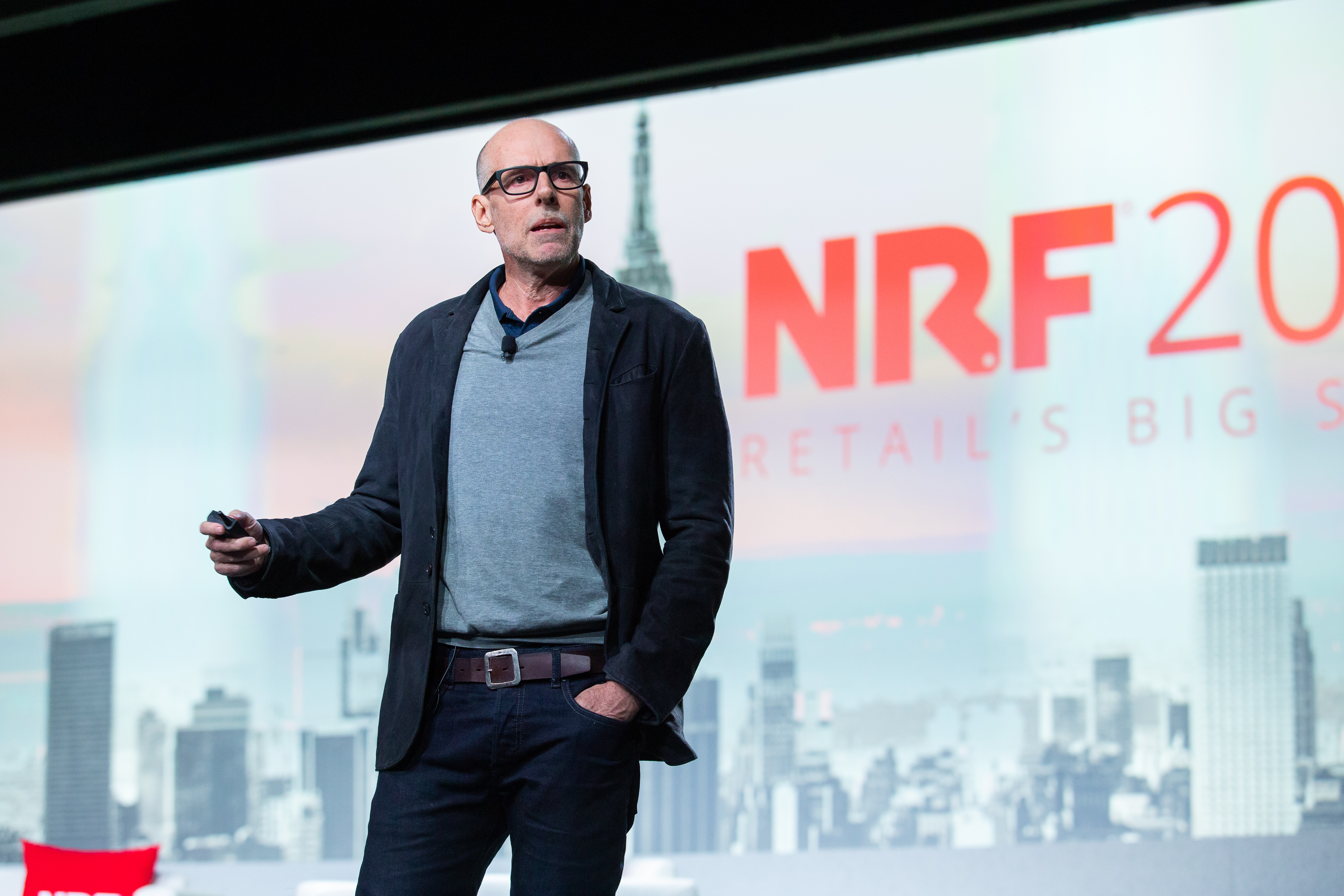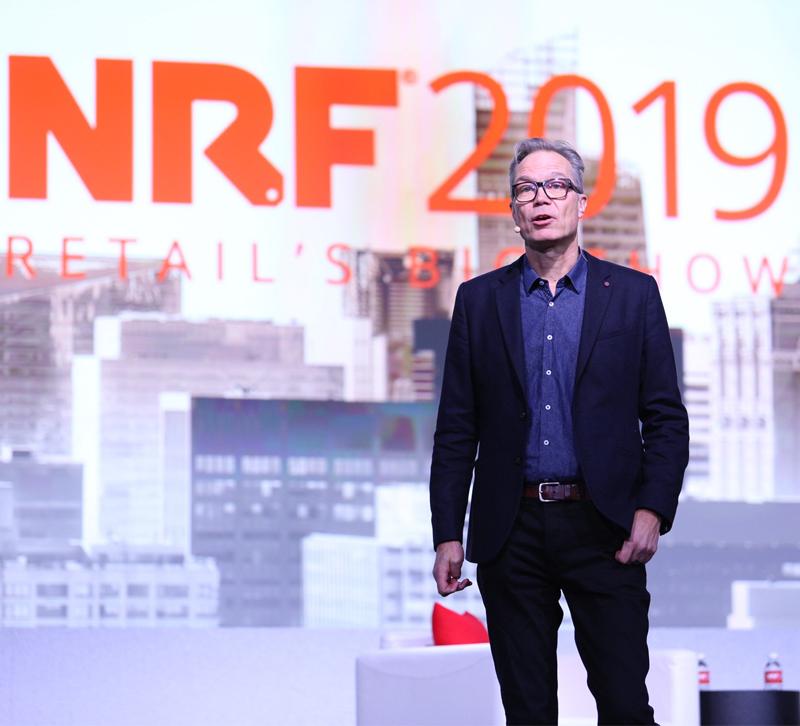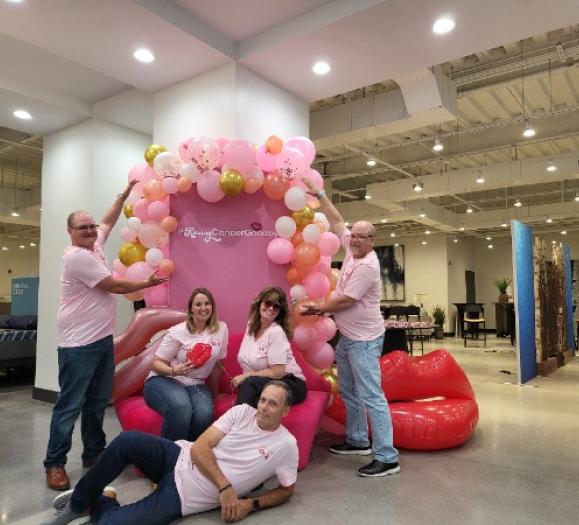Just two years ago, industry headlines were rife with store closings, bankruptcies, mass layoffs and even media reports of zombie retailers. “I would say that retail is back, but that would be wrong,” said Christopher Baldwin, President and Chief Executive of BJ’s Warehouse Club in his opening of last month’s National Retail Federation (NRF) conference. “Retail never went away. Our industry is more healthy, vibrant, innovative and exciting that ever.”
NRF conference headliner Joanna Gaines—who this week unveiled an exclusive partnership with Anthropologie—is a shining example. The widely touted collaboration between the designer and Magnolia co-founder marries the retailer’s highly individualized aesthetic and passion for unique colors and patterns with Gaines’ signature details. Debuting in stores and online at Anthropologie.com, the collection features globally inspired rugs and pillows—reflecting the designer’s affinity for a “gathered approach,” blending different styles in a way that makes any room feel more eclectic and inviting.
“During my senior year in college I’d moved to New York for an internship,” she shared during NRF. “I missed home, so on the weekends I would try to find boutiques that would make me feel like I was at home. You’d walk in and hear the music, smell the candles and for whatever reason when I was in those places, I just felt like I was at home in this big city.”

When Gaines eventually returned home to Waco, TX, she sketched out business ideas while handling accounting for her father’s Firestone Tire store. The rest is the stuff of retail legend, but the endeavor with her husband Chip was no overnight success. “The year we got married we found a little building and opened up a shop with no idea what we were doing,” she said. “I did know that I had to make $265 a day to stay in business, and so that’s kind of how my wheels were turning.”
“Out of that partnership and out of that store grew Magnolia as we know it today, which encompasses an e-commerce business, the brick-and-mortar store the Silos in Waco, a bakery, books, Magnolia Journal the magazine, and all of these things,” said Jess Cagle, Editor-in-Chief of People and Editorial Director of Meredith Corporation’s Entertainment Group.
“I always joke that in 2003 we didn’t have a business plan and it was kind of just rolling with the opportunities,” Gaines related. “We’ve done a lot of business based on gut instincts. We just felt this was the right time with the e-commerce thing and late 2015 felt right for us with the Journal. I woke up one day and thought, ‘I want to be able to connect with people,’ to extend the brand out there in a lifestyle way.”
Next month, she’ll introduce a new children’s picture book written with her kids called “We Are the Gardeners,” which chronicles the adventures of starting their own family garden, from failed endeavors and obstacles to overcome (like bunnies that eat everything!) and all the knowledge they’ve gained along the way. It will be the Gaines family’s fifth book with HarperCollins. “I like to garden and the kids like to garden with me so it just felt like this natural thing. They helped to write it and even helped pick out the illustrators. It was one of those things where we could kind of sit back and go, ‘What is it that we really love, what are we really passionate about?’ And you know, whether it be the retail store or the Journal, what we love is the idea of home, inspiring people, this sense of hope.”
A focus on diversity and inclusion
While Gaines stands out for her focus on passion rather than profits, a growing number of CEOs are committing to positively addressing issues of diversity in the workplace. According to Lars Peterson, President of IKEA, U.S., this is not only the right thing to do, but makes a great difference in the company’s ability to keep and attract talent.
“If you look at retail, we have a tremendous opportunity to take the lead in these issues. We have the most diverse workforce of all industries with 42 million people working in retail in the U.S., in both direct and indirect employment,” he related. “If we took responsibility to really drive equality, diversity and inclusion, we could be a good example for all industries and make real change across society.”
During his career at IKEA, Peterson has lived and worked in Asia, Europe and the U.S. “Throughout my journey, I have witnessed firsthand the power of people working together from diverse backgrounds, nationalities, races and religions uniting to achieve our vision of creating a better everyday life. At IKEA, our values have taught us that I, as a leader, have to stand up for what we believe in and take some real action.”
When Peterson arrived in Japan, three out of 1,000 managers were women. “So we asked women, ‘What is important for you in work?’ Not surprisingly they said it’s about the balance between work and life, and things like going home at 6 in the evening when the offices close, taking paid vacations and so on.” Six years later, when Peterson left Japan, 43 percent of all of the managers were women.
His next stint was in in Italy, specifically Catania, Sicily. There he took a strong stance in support of LGBTQ issues with a series of ads showing different family situations. “We said, ‘We are for ALL families,’ and we got lots of pushback from the government. The Family Minister actually threatened to drag us into court because we had the ‘wrong’ definition of family. But we asked our co-workers and our customers, ‘What do you think?’ and they gave us overwhelming support, so we decided to power through and continue to drive these issues.”
In the U.S., Peterson introduced IKEA’s parental leave policy, which affords both full- and part-time employees an opportunity to be off on paid leave for four months for mothers and fathers to welcome a new family member. This includes adopted children and foster families.
“It’s important to realize that there are big questions that can sometimes be intimidating with a lot of risk and a lot of hard work, but it’s not so much about the goal, it’s about moving something forward. For me, it’s pretty much a no-brainer. It’s all about people and we have more customers, more sales and a bigger talent pool to fish in, and it’s all because we’re trying to do the right thing.”
The tech factor
Finally, in a presentation dubbed “Beyond the buzz: State of retail 2019,” author Scott Galloway, the outspoken founder of Gartner L2 and NYU Stern School of Business professor, addressed retail’s 500-pound gorilla. He suggested that success now depends on retailers creating “long-term monogamous relationships” with their customers, such as the one some two-thirds of American households currently have with Amazon Prime.
“Most of you are in dating businesses,” Galloway said. “Every day you’ve got to figure out a way to convince your consumer not to go for the bigger and better deal down at the other end of the bar and to instead come back into your store. And as a result, the marketplace values your companies at a multiple of EBITDA, whereas recurring revenue monogamous relationships it values at a multiple of revenues.” According to Galloway, recurring revenue bundles (like Amazon’s) are the key to adding massive shareholder value relative to top-line growth.
“In a low-growth environment, how do you increase your revenues 20 or 30 percent over the next five years, but also double your stock price? I think the key is around business model and that everything comes down to biology. Households that are creating wealth are in monogamous relationships and I think that the marketplace and investors like companies that are able to enter into monogamous, recurring revenue relationships with their customers. I would argue that the majority of companies that are adding extraordinary amounts of shareholder value have a recurring revenue bundle central to their proposition.”

With a reputation as one of Amazon’s fiercest critics (indeed Galloway called the tech giant, “arguably one of the most destructive forces in our economy,”) he believes “that one of the biggest mistakes that we make in retail is that we think that choice is a positive. Consumers want less choice. They’re time-starved and they just want to be more confident in the choices that they’re making."
Galloway pointed to Restoration Hardware as an example of a company that has created monogamous relationships with consumers via its membership program. “This is not a technologically sophisticated company, but 95 percent of its transaction volume now goes through its membership program,” Galloway noted, adding that Restoration’s revenues are up 17 percent, while the stock price is up 100 percent.
As for the tech behemoth, he said, “Amazon has your credit card, your purchase history, a decent amount of AI (artificial intelligence) and access to every product that you would ever want. And they’ve announced that they’re going to begin sending you products before you even ask for them. I think that’s the future of Amazon: They are going to send you two boxes, one with the stuff they think you want, and a second that’s empty. You’ll put the stuff you don’t want back in the second box, and you’ll manicure your consumer life with Alexa. ‘Alexa, barbecue for six people, three vegans.’ Or, ‘Alexa send me 11 quotes for auto insurance for a 2017 GL 450 via email by tomorrow at 12.’ They’ll call it something like Prime Square and they’ll take Prime households from $1,300 a year to $2,000 to $3,000 in sales. The stock will become anti-gravity and we’ll freak out even more about the dominance of Amazon.”







